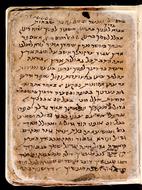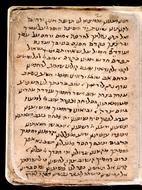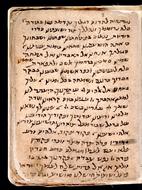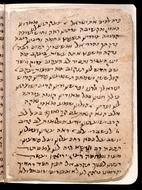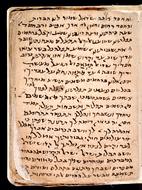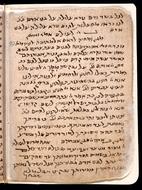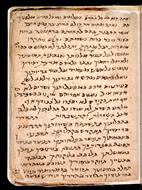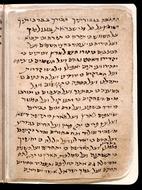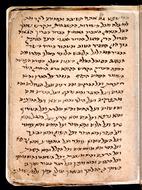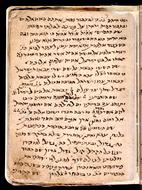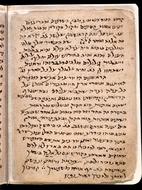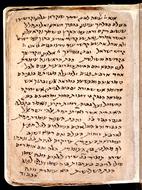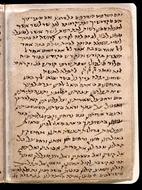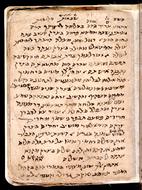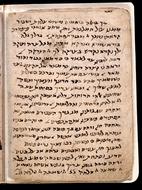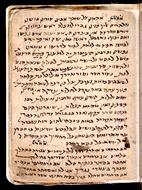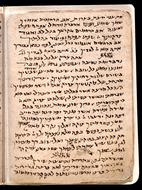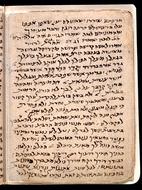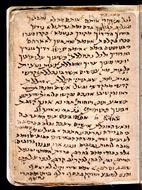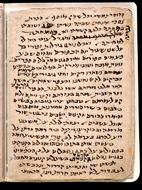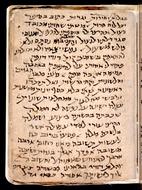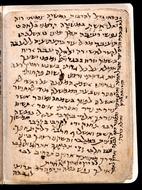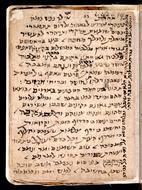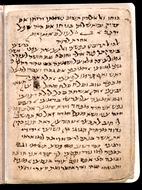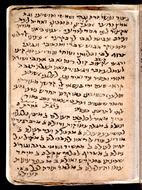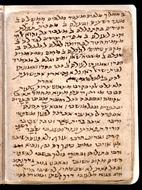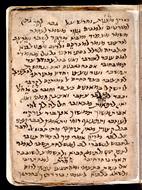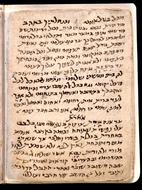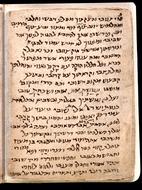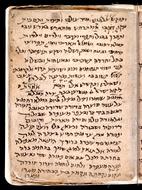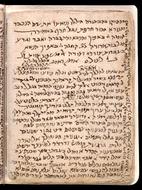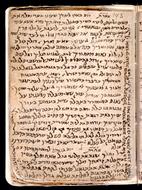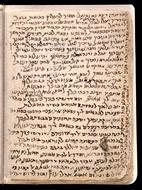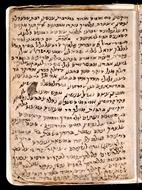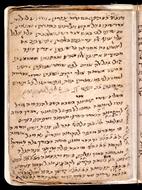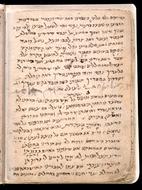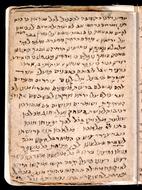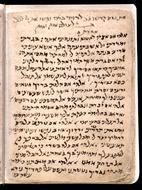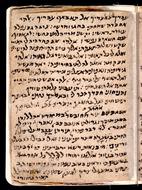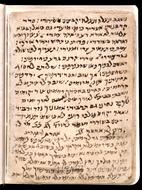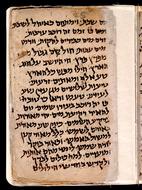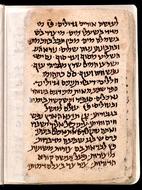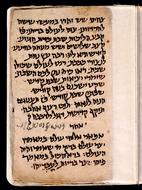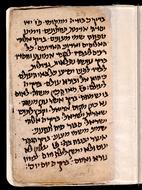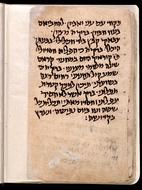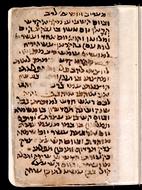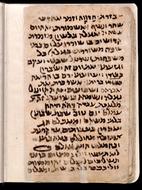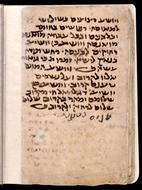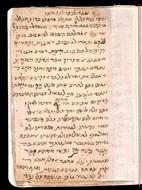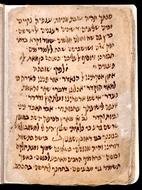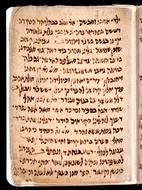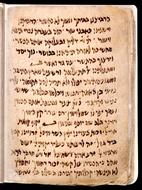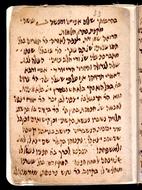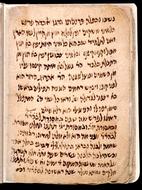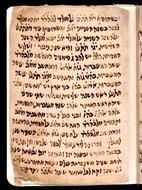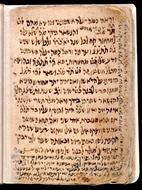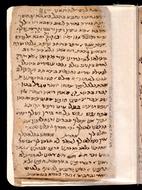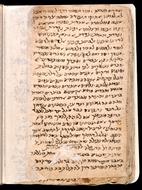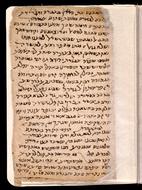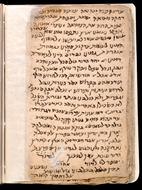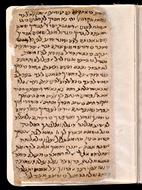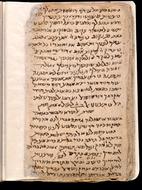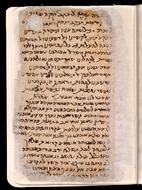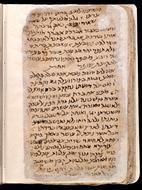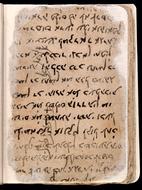Halper 275 Collected liturgical poems
Title
Collected liturgical poemsCall number
Halper 275(Philadelphia, United States, University of Pennsylvania, Center for Advanced Judaic Studies Library, Cairo Genizah Collection)
Alternate identifiers
Publisher
Center for Advanced Judaic Studies LibraryLanguage
Judeo-Arabic; HebrewOrigin
12th century-14th century?
- Place
-
Orient
Notes
- In hand 1, strophe endings denoted by a semi-alef, sporadically vocalized, corrections and completions in exterior margins; in all alternate hands, verse endings denoted by a punctus; Fol. 17 is numbered "ב" as if it were the beginning of the second fascicle; fascicles 5 and 6 are taken from other codices and their empty pages (30; 35-36) serve here to continue the copy. The copyist then needed more pages so he dismantled a fascicle from a codex of Kitāb al-Aymān whose copy was discontinued in mid-sentence, leaving at least six blank pages and most of a seventh. He inverted them, and used the blank area to complete the copy. At least one of these folios is missing; This may be the beginning of the collection as is indicated in the heading at the top of fol. 1. בשם י'י נעשה ובצילו נחסה; A. (fols. 1-4) Heading: שבחות. A lengthy Shevaḥ of 23 eight-verse strophes, that starts אבוא לפניך בתחנון. All the verses of each strophe start with the same letter, the acrostic reads א-ת יצחק הכהן; B. fols. 4-8) Heading מגן ומחיה לראס אלמתיבתה אלפיומי זצ״ל. A lengthy Shevaḥ by R. Sa'adia Gaon that embellishes the first two blessings of the 'Amidah. Starts זוכר חסדי אבות ועונה לבנים; partially published from this source by Halper, Post Biblical Hebrew literature / B. Halper. Philadelphia : JPA, 1921, p. 33-36, and incorporated into (Sidur Rav Seạdyah Gaon / Israel Davidson [ed.]. Jerusalem : Meḳitse nirdamim, 1963, p. 377-379. Republished and completed by M. Zulai: ha-Askolah ha-payṭanit / Menahem Zulay. Jerusalem : Shoḳen, 1964, p. 218-226; C. (fol. 9) Heading שבחות מליחות, s Shevaḥ(or possibly a Seliḥah)אתאנו עדיך היום (the last word איום has been corrected). 7 four-verse strophes, in each, the first three verses are arranged alphabetically, the fourth starts with בצדק followed by a different patriarch; D. Heading אחרת (as is the heading in the rest of this ms. ). Of the same type as the preceding. אתחנן אליך שוכן מעוניי, ten four-verse strophes (א-י), every fourth verse is biblical; E. (fol. 10) A Seliḥah, אתאנו על שמך אבינו צורינו. Seven four-verse strophes, the verses form the acrostic א-ת זבדיה. Published from this source by J. Schirmann: Shirim ḥadashim min ha-genizah / Jefim Schirmah. Jerusalem : ha- Aḳademyah ha-leʾumit ha-Yiśreʾelit le-madaʹim, 1966, p. 422-424; F. A short Shevaḥ אב הרחמים אייחדה שמך ימים ולילות. Seven two-verse strophes, each starts אב הרחמים, the acrostic signature formed by the next word is יפת חזק; G. Another, אתה צדיק על כל הבא, six strophes the first three form the acrostic signature משה בן שמואל; H.(fols. 10-11)איששת גפן בהדריה. Eleven four-verse strophes, the last verse of each strophe is biblical, in which the first word is למה; H.(fols. 11-12) Heading לדויד, probably David Ha-Nasi, as are the following four. A Shevaḥ, אמרו לאשה קדישה ופרושה. Seven strophes of four verses, the first three are alphabetically arranged, the fourth is biblical, sometimes incatenated into the following strophe; I.(fols. 12-13) A lengthy Seliḥah אפסו בעוני עצי המערכה, twenty-two four-verse strophes (א-ת), the acrostic signature of the last four verses reads דויד; J. (fol. 14) A Tokheḥah, אי לך נפש במה תתייהרי(Davidson, Thesaurus of Medieval Hebrew poetry. New York : JTS, 1924, 2626). The same scheme as the preceding; K. (fols. 14-15) The heading also attributes the next poem לדויד. A Baḳashah אלהי אל תריבני כפשעי (Davidson, TMHP א 4364)twenty-two verses (א-ת)monorhymed עי-; L. (fol. 15) ברוך מאיר לכל באי העולם, of the type which serves as a Reshut for ברוך שאמר. Twenty-two verses (א-ת) monorhymed לם-; M. (fols. 15-116) הלא על כי [אין] אלוהי בקרבי (Davidson, TMHP ה 669). Forty-two verses, monorhymed בי-; N. (fol 16) למה תריבי אלי כנסת בת עמי. Nineteen verses monorhymed מי-; O. (fols. 16-18) A Seliḥah עד אנה אשית עצות בנפשי . About 75 verses monorhymed בי-; P. (fol. 18) A Shevaḥ מקוה ישראל ה' מושיעו בעת צרה. Twenty verses monorhymed רה-, forming the acrostic signature משה בר שמואל חזק(Moses ben Samuel Gikatilla?); Q. (fols 18-20) A series of six Seliḥot by Joseph ben Abitur, in each of them the first strophe forms the acrostic signature יוסף. Published by Halper, Post Biblical Hebrew literature / B. Halper. Philadelphia : JPS, 1921, p. 41- 46); Listed, along with parallel ms. sources, among Seliḥot of Joseph ben Abitur, by E. Fleischer, (Yetsirato shel Yosef ibn Avitur / Ezra Fleischer (Doctoral dissertation). Jerusalem : Hebrew University, 1968, p. 504-505). This series is organically connected as each begins with יום, and the next word is in alphabetical order; In all, the strophes are constructed of four verses, three are alphabetical, the fourth is from a Psalm which is the theme of each poem. The theme Psalms are CXX-CXXV successively. The following poem in this series is found at the end of this fascicile (p. 24, Y); R. (fol. 21) The heading attributes this ליחזקאל הכהן (Ezekiel ben 'Ali ha-Kohen Albasir?). A Seliḥah אלוהי אכלתני וכילתני אנחתי. Eleven strophes of four verses, 1 and 2 alternate אלהי/ראה, 3 and 4 are alphabetical alphabetical א-ת), 4)is a verse from Psalms; S. (fols. 21-22) A Shevaḥ אם אויבים הניאוני והונוני. Twenty-two verses (א-ת) monorhymed תו-; T. (fol. 22) A Shevaḥ אשלים שירי תמימה. Twenty-two verses (א-ת)monorhymed מה-. The refrain, after every third verse: המוהלל בפי כל נשמה; U. A Shevaḥ אשחרך בדברך אלי. Twenty-two verses (א-ת)monorhymed לי-; V. (fols. 22-23) A Shevaḥ אדרי יחידתי קונךותני מעט מהלליו. Nine strophes of four verses, the first three of which form the alphabetic acrostic, the fourth is from the theme Psalm, CIII, at times, incatenated into the following strophe. The acrostic signature reads כלף חזק; W. (fols. 23-24) A Shevaḥ אלוהי אם אצתי לחטוא ותזניחני. Eleven strophes of four verses, the first two of which form the alphabetic acrostic, the third forms the acrostic signature [אלעזר בן יפת חז[ק, the fourth is a verse from Psalms that starts with אל; X. (fol. 24) A Shevaḥ אשגב שם צור רוח ובשר. Eight strophes of four verses, the first three of which form the alphabetic acrostic, the fourth is from the theme Psalm, XXIII. The acrostic signature reads סהלאן; Y. Under the heading ליוסף הרב, the seventh Seliḥah of the series by Joseph ben Abitur, the first six appear earlier in this fascicle (fols. 18-20, Q). Starts יום זכרתי גדלך (TMHP IV 187; Fleischer, ibid. pp. 505-506), on Psalm CXXVI. The fascicle ends after the first two strophes; Attached here is a fifth fascicle (fols. 25-30) which originated from a different codex, written in a two different hands (25-27;28-29). On the remaining empty folio (30) the copy of the primary codex (1-24) continues; Z. (fols. 25-26) The last 16 four-verse strophes (ז-ת)of an unknown Yotser. Ends תוקף קדושת דגול מרבבה; AA. (fols. 26-27) Another Yotser, אפאר אלוהי עולם. Twenty-two strophes (א-ת)of three verses, the third of which starts with ברוך. The poem is structured on phrases from the prayer ברוך שאמר, as it probably functions as a Reshut for this prayer. The inscription ends at the end of the poem, after two thirds of fol. 27 verso, the remainder is blank; The next two folios (28-29) are written with a dull reed, in a different (third) hand; BB.(fol. 28) Headed מעריב ויושע לרב, a Maʹariv for the Seventh day of Passover (in which the reading is from Ex. XIV 30- Ṿa-yoshaʹ), by Joseph ben Abitur. Starts וביום השביעי מקרא קודש); Listed among the Ma'aravot of Joseph ben Abitur, by E. Fleischer, (Yetsirato shel Yosef ibn Avitur / Ezra Fleischer (Doctoral dissertation). Jerusalem : Hebrew University, 1968, p. 321. There are no other ms. sources of this listed there; CC. A Zulath for the same occasion, יהיה לכם ראש חדש למזכרת; DD. (fol. 29) Heading ז' ויושע, the Kallirian Shivʹata for the same occasion, ויושע אום כבבת נצורה . Four-verse strophes, the first starts ויושע, the third ויושע כן יושיע. The inscription ends at the end of the poem, after two thirds of fol. 29 verso, the remainder is blank;The copy of the primary codex (fols. 1-24) resumes here; EE.(fol. 30) Heading שבח לניסי אלנהרואני . The Shevaḥ starts אויבי נעשו פלילי. Twelve four-verse strophes, forming the acrostic א-ת ניסי; FF. Another Shevaḥ by the same author, אויבים קמו עמך לדחוק. Ten strophes of three lines, the first is alphabetic (א-י), the second forms the acrostic signature נישי בן ברכיה, the third is from Psalms; The next, sixth fascicle (31-36) is on a different paper, as it too has been inserted here from a different codex. The first four folios (31-34) are written in a different hand, interrupting the sequence. Here too the copyist of the primary codex (1-24), continues his work on the remaining blank folios (35-36); GG. (fol. 31) Heading רשות לחתן ליהודה הסופר. Starts אמללים וגם נאלים יקומים; HH. (fols. 31-33) A Shivata אזון אנקתינו האל הנאדר, each of the seven strophes (א-ז)is constructed of 6 verses of the same letter, and 4 more, with a different rhyme, starting with the names of the tribes of Ishmael, and ending with a pair from the Tribes of Israel; These form the acrostic signature משה בן רבי יצחק הספר דמן צור חזק (Moses ben Isaac of Tyre). Published, from parallel ms. sources, by M. Zulay, Yediʹot ha-makhon le-ḥeḳer ha-shirah ha-ʹIvrit v. 5 (1939), p. 171-174; Followed by a paragraph on the interpretation of dreams, titled מקצת פתרון חלומות based on excerpts from Talmud Berakhot 56b-57a; Fols. 33-34 An essay on the calculation of the New Moon, involving Rabbinic formulations; These last five folios (35-39 recto) resume and complete the copy of the primary codex (fols. 1-24, 30). The remainder of this ms. is a series of poems by Nissi al-Nahrwani, under the same heading as EE (fol. 30). The first 6 are of the Shevaḥ type; II. (fol. 35)אנוש כחציר נחבא, seven strophes of 4 verses, ordered א-ת. Published from this source, by J. Schirmann, Shirim ḥadashim min ha-genizah, 1966, p. 26; JJ. אשמנו בכל מהלך, twenty-six three-verse strophes, forming the acrostic א-ת אלוף; KK. (fols. 35-36)אותות שבטים באגודה אחת, Seven strophes of four verses forming the acrostic א-ששתת ניסי; LL. (fol. 36)תופשי התורה בעדותם נגעו, twelve four-verse strophes, two letters per strophe forming the acrostic ת-א ניסי. Published from this source, by J. Schirmann, ibid. pp. 27-28; MM. (fols. 36-37)תציץ בעלבוני גואל ומושיע, twenty-three three-verse strophes, ordered ת-א. The acrostic signature formed by the second verses נישי בן ברכיה מן נהרוואן יחי. Each third verse is biblical, starting with כי; NN. (fols. 37-38)אל תירא נתבשר במחזה, seven strophes of four verses, forming the acrostic א-ששתת ישי; OO. (fol. 38) an ʹAkedah, possibly for Rosh ha-Shanah; PP. A Shevaḥ אוהלים יושב מבית אביו, probably 7 strophes of four verses ordered א-ת, the folio ends at the beginning of the first ש verse. There is a lacuna between fols. 38 and 39; QQ. (fol. 39 recto) The last 7 strophes of an unknown piyyut, four verse per strophe, two strophes per letter. The fragment contains strophes צ-ש; In the bottom margin of the recto are two lines of an inscription written in the opposite direction, in Judeo-Arabic. This continues on the verso. The paper is cut in the middle of a line, both at the top and at the bottom, indicating that this inscription was the primary usage of the paper; The content is fragment of R. Ḥai Gaon's Kitab al-Ayman part I , "gate" 5 on the oath in a dispute between a tenant and his lord, including a citation of Talmud Bava Metsia 110a, as found in Petersburg RNL Yevr.-Arab I 2939 fol. 7, parallel to, in the Hebrew version (Jerusalem, 1960) p. 24.
- Condition: complete, mostly consecutive; marginalia; 4 identifiable hands.
Extent
13.5 X 9.8 cmSupport
PaperLayout
Decoration
Material applied: black ink
Script
Provenance
- Cairo Genizah Collection (University of Pennsylvania. Center for Advanced Judaic Studies. Library).
- Cairo Genizah Collection (Dropsie College. Library).
- Adler.
Subjects topical
- Judaism , Liturgy , Texts
Licenses
-
- Text
- These images and the content of Center for Advanced Judaic Studies Library, Halper 275: Collected liturgical poems are free of known copyright restrictions and in the public domain. See the Creative Commons Public Domain Mark page for usage details, http://creativecommons.org/publicdomain/mark/1.0/.
- URL
- http://creativecommons.org/publicdomain/mark/1.0/
-
- Text
- Metadata is ©2017 University of Pennsylvania Books & Manuscripts and licensed under a Creative Commons Attribution License version 4.0 (CC-BY-4.0 https://creativecommons.org/licenses/by/4.0/legalcode. For a description of the terms of use see the Creative Commons Deed https://creativecommons.org/licenses/by/4.0/.
- URL
- https://creativecommons.org/licenses/by/4.0/legalcode

